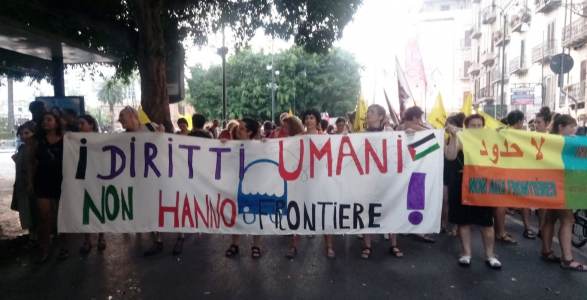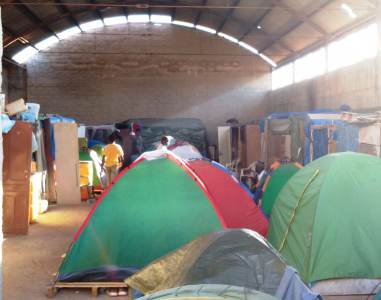The story of Salifù, from Libyan hell to a present of exploitation in Italy
“Do you know that the people who die at sea are much more than what is written in the newspapers? Do you know that in Libya the days are hell? Not to mention the nights. And you can’t imagine how ‘you don’t live’. Many of us hope that death will take us so as not to suffer what we have suffered and we continue to suffer here, too. I do not have the courage to take my life and I do not want to displease Allah who is my only anchor of salvation, he who helps me to overcome the difficulties I encounter every day.
These are the words of Salifù, who has been in Italy for 6 years, two of which spent in Palermo, who speaks while we comment on a bench the latest news of missing Tunisian people.
Like many others, Salifù hopes that the wind will blow from a different quarter, even if many critical points remain, since those who exercise power always need a scapegoat, and until you find a different one, for now the migrant who comes from the south remains. South understood as poverty, south understood as danger, south that in the heads of most people who do not want to hear anything but the screaming of fascist politicians, is the migrant who arrives from the sea.
Closing ports, raising walls, defending borders are the slogans of a Europe that reduces the immigration commissioner’s role to the “protection of the European way of life”, to reduce the migration issue to a question of security and even a question of defending identity, with the approval of the border lobbies, the largest European industry. The inseparable combination of “migration and security” means more money for Frontex, it means more money for networks, drones, walls, body scanners, it means more weapons, it means more death. This is the wind that continues to blow in Europe beyond what is happening to Italian politics, in full confusion and evolution, but always characterized by a poor and violent dialectic.
While the newspapers are attentive only to what happens in the north of the world, in Libya thousands of people continue to be victims of abuse, torture and violence thanks to agreements with Italy and Europe, to which in these days both the Prime Minister Conte – at the meeting of the Fratelli d’Italia party – and the Minister of the Interior Lamorgese – at the summit for redistribution held in Malta – continue to give credit showing the clear intention to continue on this path. Only a few days ago, the newspaper Avvenire quoted some paragraphs of the UN report denouncing the involvement of the Libyan coastguard in the trafficking of human beings: “The sequence of violations calls into question the responsibility of those countries, like Italy, which finance and equip the Libyan authorities with non-refundable funds, without ever being able to obtain even the slightest commitment to the respect of fundamental rights”.
Last week the International Organization for Migration (IOM) denounced the killing of a Sudanese man who had tried to escape after being captured at sea and brought back to Tripoli by the so-called Libyan coastguard. The colours of governments may change but the criminal policy of European governments does not.
In any case, politics can never put a gag on people who have huge scars on their bodies and especially inside their souls.
And Salifù is not indifferent to the videos of these days about the latest autonomous arrival on the coast of San Leone in Agrigento.
About 25 people have arrived from Tunisia in search of a better future while politics deliberately facilitates the work of traffickers, creating invisible subjects that are easy to exploit. There is too much silence about the fate of the Tunisians. Thus, in the centres for repatriation or in the hotspots, acts of self-injury or attempted suicides are the order of the day, as the migrants drop-in centre in Caltanissetta testifies: “Inside one of these fences, this morning, two young man swallowed a neon lamp in pieces. How much of a desire to die does it take to swallow a neon lamp? From that fence twice a week, on Sundays and Thursdays, people are deported, sent back to the place they fled. And in that same enclosure, every Saturday and every Wednesday, the tragedies of those who, in order not to resign themselves to an unwanted destiny, choose the greatest resignation. At the cost of atrocious suffering. That enclosure is the detention centre of Pian del Lago, for many a 5-star hotel, for others the main company in our city. For us a place of death. Even when there is no death, it passes by and goes beyond.”
Salifù like others, many others, arrived in Italy after traveling and escaping death, he felt another pain, faced disappointments and obstacles, which brought him to the brink of suicide: “You should not be surprised when someone tries to kill him- or herself. The pain is too strong, the fear to feel again the same atrocities torments us, our wounds bleed every day. I am not ashamed to say that I have thought many times about ending it. Allah helps me not to do it, but when I lost hope of having a residence permit I said enough. Then luckily I met an angel who accompanied me and gave me hope again. A mediator who literally took me by the hair, after some operators, betrayed me, exploited me”.
At this point the story of Salifù stops for a moment and then returns to point out that some operators have helped him initially in exchange for sex. At the beginning he thought it was love until he discovered that it was an established practice. “From the moment I reached the bottom, I realized that I could use my body to live, since I had nothing left, I had been exploited and then replaced with somebody else. So today I sleep with women and I get paid, and you know I can eat, I can have a roof and I can send money home. My mother doesn’t know what I do for a living, she doesn’t ask me, and often when I end up being the object of a woman’s desire I cry but immediately afterwards I dress up and I think that until I find other possibilities I will continue to prostitute myself. Don’t judge me, I know it’s not right, but I have to eat”.
Salifù has just renewed his residence permit and will return to Foggia and its surroundings. He doesn’t have one home, “I am a citizen of the world”, and he will continue his struggle for his own rights and those of his friends, which he defines as “slaves of the north, slaves of men and women without any shame”.
He defines himself as lucky to have met people with a soul, and he has rediscovered the desire to dream: “Listen, I also have a dream: I want to find a woman who loves me for what I am and start a family, a woman who can forgive everything I have done and would like to have many children, my mother is looking forward to becoming a grandmother.”
Alberto Biondo
Borderline Sicilia
Translation by Sandra Krause



